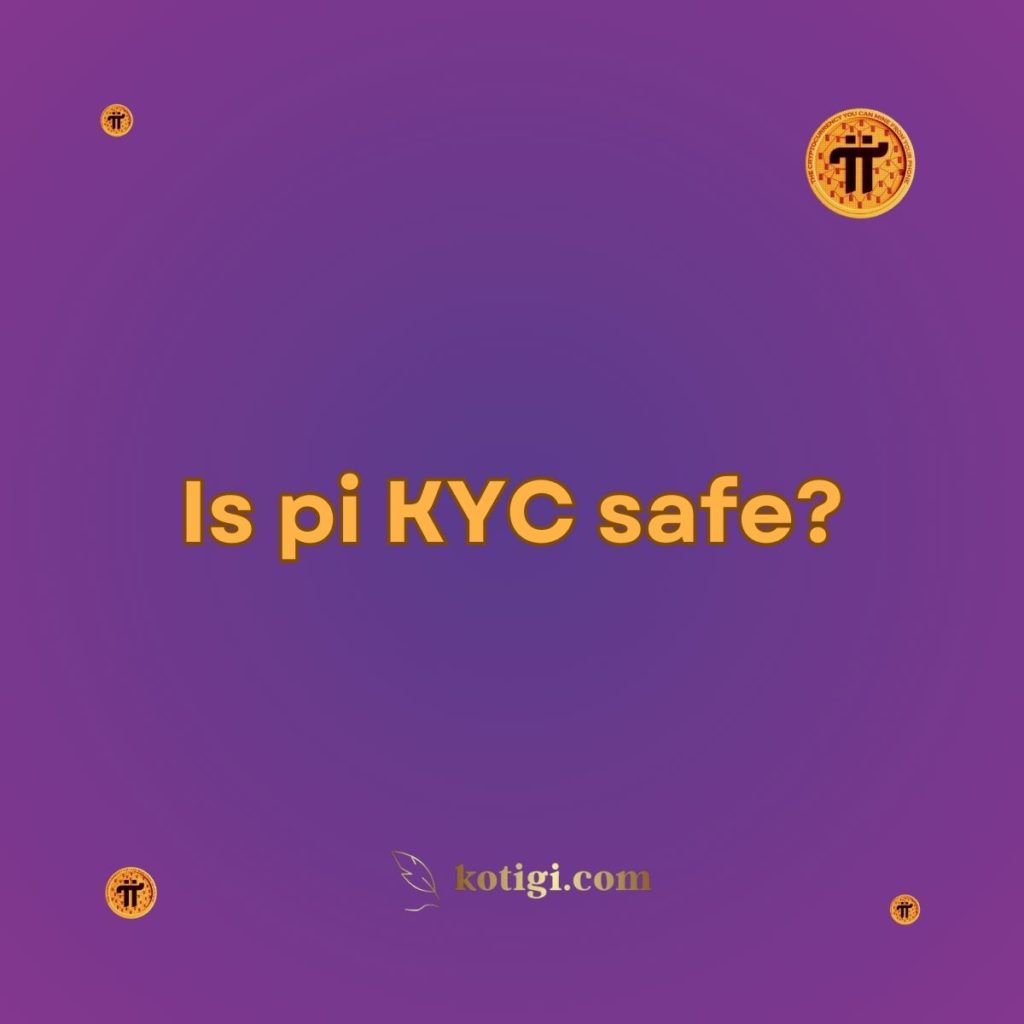
Is pi KYC safe?
Yes, Pi Network’s KYC (Know Your Customer) process is designed to be safe. It uses advanced security measures to protect users’ personal information, ensuring privacy and security. The KYC process helps verify user identities, preventing fraudulent activity and ensuring that Pi coins are distributed to real people. Users should complete KYC only through the official Pi Network app to avoid scams.
Introduction
As Pi Network advances through its development stages, the KYC (Know Your Customer) process has become a crucial step for users to validate their identity and participate in the upcoming open mainnet phase. Many users wonder about the safety and security of the Pi KYC process, given the sensitive personal data involved. This article explores what Pi KYC is, how it works, and whether it’s safe to use.
What Is KYC and Why Is It Important?
Purpose of KYC in Pi Network
KYC (Know Your Customer) is a verification process used to confirm the identity of users. In Pi Network, the KYC process ensures that only real people can mine and hold Pi coins, preventing fraudulent accounts, bots, or malicious activities. By verifying each user, Pi can maintain a trustworthy and secure ecosystem.
KYC is an essential step for users to fully participate in the Pi Network, especially as the platform moves toward its open mainnet phase, where users will be able to trade Pi coins on public exchanges.
What Information Does KYC Require?
The Pi KYC process requires users to submit personal information, such as:
- Full Name: As it appears on legal identification documents.
- Government-Issued ID: This can be a passport, driver’s license, or national ID card, depending on your country.
- Selfie or Photo Verification: Users must upload a selfie for facial recognition, which is matched with the submitted ID to ensure the applicant’s identity is valid.
The process is designed to confirm that the person mining Pi is who they claim to be, preventing bots and fake accounts from exploiting the system.
How Does Pi Network Keep KYC Safe?
Advanced Encryption Technology
Pi Network uses advanced encryption technologies to secure user data during the KYC process. All personal information submitted during KYC is encrypted to prevent unauthorized access. Encryption ensures that even if a malicious actor intercepts the data, they cannot read or use it because it is scrambled.
Decentralized KYC Validation
Pi Network employs a decentralized approach to KYC verification. Rather than relying on a single centralized authority, Pi uses verified human validators from within the Pi community. These validators review KYC applications in a secure manner, ensuring that user information is processed without risk of exposure to bad actors. Validators have limited access to the data and are strictly monitored to maintain security and privacy standards.
This decentralized model adds an additional layer of safety, as it reduces the risk of large-scale data breaches that can occur when information is stored in centralized databases.
Data Privacy and Compliance with Regulations
Pi Network emphasizes user privacy and adheres to international data protection regulations, such as the General Data Protection Regulation (GDPR) in Europe. This means that Pi’s KYC process is legally obligated to protect users’ personal information and give users control over their data.
Pi also states that users’ personal information will not be shared with third parties without consent, ensuring that data remains private and secure.
Is the Pi KYC Process Safe for Users?
Legitimate and Official KYC Process
To ensure safety, it’s important for users to only complete KYC through the official Pi Network app. The Pi Core Team has warned users against attempting KYC on unofficial platforms or third-party websites. Scammers may set up fake Pi KYC websites in an attempt to steal personal information, so it’s crucial to follow the official process and be wary of external platforms.
Security Measures in Place
- Encryption: As mentioned earlier, all KYC data is encrypted, making it nearly impossible for anyone to access the data without the proper authorization.
- Strict Validation Protocols: Pi’s validators only see the information they need to verify the user, minimizing the exposure of personal data.
- User Control: Pi Network’s KYC process allows users to manage and control their personal data, including the ability to delete their data if they no longer wish to participate in Pi Network.
Risks of Using Unofficial KYC Platforms
Unfortunately, scams and fake websites claiming to offer Pi KYC services do exist. These platforms are often set up to collect personal information, which can then be used for identity theft or sold to third parties. Users should always be cautious and verify that they are using the official Pi Network KYC process through the app.
How Does Pi Network KYC Compare to Other Cryptocurrencies?
Similarities to Other Crypto KYC Processes
KYC is a common requirement for many cryptocurrency platforms, especially exchanges. Major exchanges like Binance, Coinbase, and Kraken all require users to complete KYC to trade, withdraw, or deposit large amounts of cryptocurrencies. Pi’s KYC process shares many similarities with these platforms, including the need for government-issued IDs and facial recognition.
Like Pi, other crypto platforms use encryption and secure protocols to protect users’ data. However, Pi’s decentralized KYC system is a unique feature that sets it apart from the centralized systems used by most exchanges.
Pi’s Decentralized Validation
Pi Network’s decentralized KYC validation is one of its key innovations. Unlike centralized platforms where KYC is handled by a single authority or company, Pi’s validation process is carried out by a group of verified community members. This decentralization reduces the risk of large-scale data breaches and provides a more transparent system for users.
Completing the Pi KYC Process: Step-by-Step
For those who are ready to complete the KYC process, here’s a general outline of the steps:
- Access KYC in the Pi App: Users will receive a notification in the Pi app when it’s their turn to complete KYC.
- Submit Personal Information: Enter your full name and upload a photo of your government-issued ID.
- Facial Recognition: Take a selfie, which will be used to match your ID photo and verify your identity.
- Validation by Pi Validators: Once submitted, your information will be processed and verified by Pi’s human validators.
- Confirmation: After successful validation, you will receive confirmation in the Pi app that your KYC is complete.
It’s important to note that only users who pass the KYC process will be able to transfer Pi or trade it once the open mainnet launches.
Conclusion
Pi Network’s KYC process is designed with user safety and privacy in mind. The use of advanced encryption, decentralized validation, and compliance with data protection regulations ensures that users’ personal information remains secure. As long as users follow the official KYC process through the Pi app and avoid unofficial platforms, they can be confident in the safety and integrity of Pi’s KYC system.
Key Takeaways:
- Pi Network’s KYC process is designed to be safe and secure, using encryption and decentralized validation.
- Users should only complete KYC through the official Pi app to avoid scams.
- Personal information is protected, and Pi complies with international privacy regulations.
- Pi’s decentralized KYC model reduces the risk of large-scale data breaches.
- Completing KYC is necessary to fully participate in Pi’s open mainnet and trade Pi coins.




